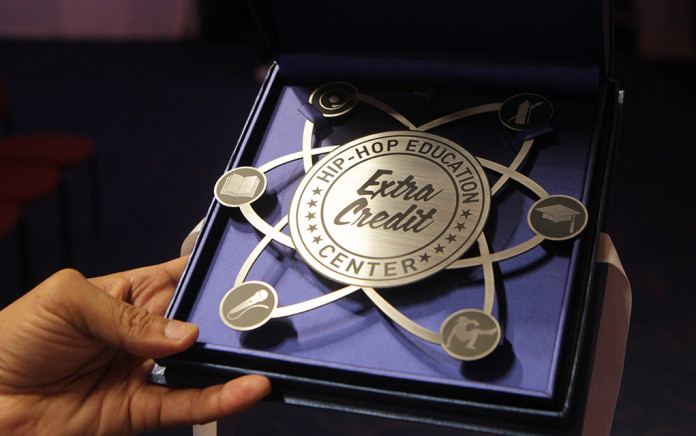In a recent conversation with an older woman, the topic of hip-hop came up.
“Ugh. Hip-hop,” she snorted. “I watched the VMAs because my niece was watching. Disgusting.”
I smiled, countering with the standard, first line of defense retort that hip-hop proponents often counter with.
“That’s not ‘real’ hip-hop you know.”
She didn’t, of course, and probably had no good reason to. The depth and expansiveness of hip-hop’s musical, artistic and cultural significance is often lost on those not connected with it, lost even on many who are, thanks to the constant bombardment of formulaic, carefully curated, pop-culture fare.
“Between Miley Cyrus, Chris Brown and Nicki Minaj’s…” She paused, sneeringly. “…ASS, this stuff is not fit for children,” she concluded.
Skipping the part where Cyrus and Brown aren’t exactly “hip-hop,” I had to go further.
“Well, what you’re seeing isn’t indicative of hip-hop as a whole,” I said, “For instance, I’ve worked with people who do great work in the field of hip-hop education…”
The woman, the wife of a long-time educator, snorted again.
“It’s true!” I promised. “There is a program called Fresh Prep — I just interviewed one of the original guys involved — they increased students’ Regents pass rates by, like, 80%!”
I could hear her roll her eyes through the phone. She wasn’t convinced.
“I know a woman who developed a wonderful program teaching literacy using hip-hop and The Odyssey!”
At this point, her snort turned to a short burst of incredulous laughter.
I tried to convince her some more, with little effect. I gave up, feeling dejected. Knowing how important education is for the next generation, and how far behind we are as a nation, particularly when it comes to young people of color, and having personally witnessed how effective hip-hop can be as a vehicle for learning, I wondered if attitudes like hers toward hip-hop education was preventing the field from moving forward.
The conversation returned to my consciousness as I witnessed the inaugural Extra Credit Awards at NYU on November 11, 2015, orchestrated by the Hip-Hop Education Center, an organization launched in 2010 by longtime hip-hop education advocate Martha Diaz in collaboration with NYU’s Metropolitan Center for Research on Equity and the Transformation of Schools.
In her mission to “cultivate and professionalize the field of hip-hop-based education,” Diaz discovered the existence of more than 300 hip-hop ed programs across the United States, and in the past year, along with Carlos “Mare139” Rodriguez, has pivoted her work to create an online “Communiversary” to serve as a central hub for the movement.
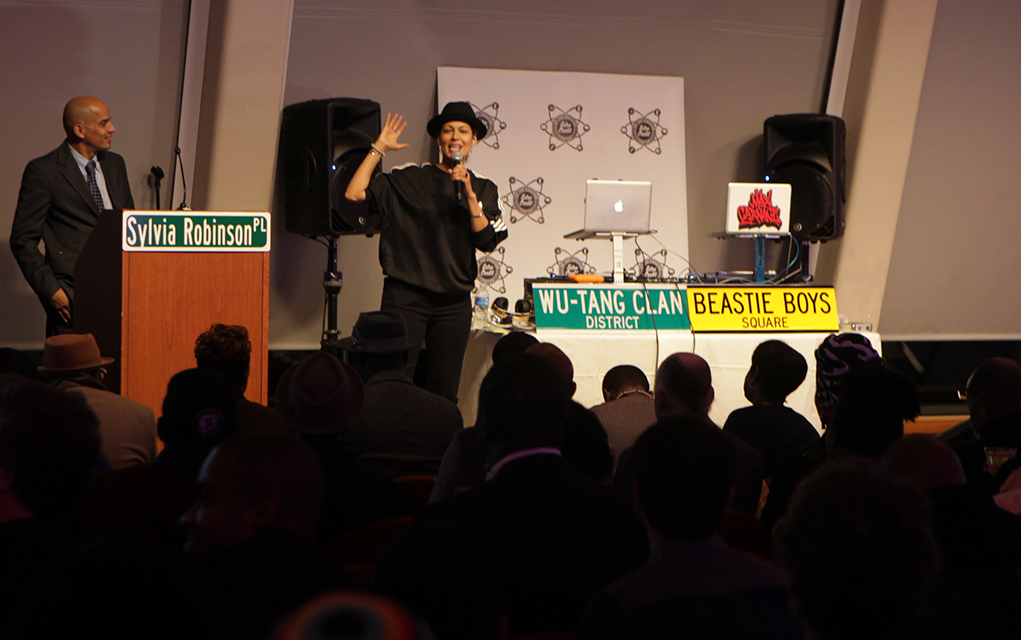
The fact that years of Diaz’s work was spent trying to legitimize something that has seen plenty of verifiable results, speaks volumes about the challenges when working hip-hop into fields not traditionally associated with the artform or culture.
In part to counter some of these preconceived, snort-worthy notions, the organization staged their first Extra Credit event, a combination awards ceremony and fundraiser, that proved to be inspiring and, well, educational.
Had this woman who I was trying to convince been in attendance, she would have seen award recipients like Dr. Olajide Williams, Artie Green, Easy AD and Doug E Fresh of Hip-Hop Public Health, an organization on a mission to help end health illiteracy through multi-media programs, research and youth outreach.
She would have seen the passionate speech given by Christopher Emdin who, along with Wu-Tang member GZA, orchestrates Science Genius, an organization that seeks “to meet urban youth who are traditionally disengaged in science classrooms on their cultural turf, and provide them with the opportunity to express the same passion they have for hip-hop culture for science,” as well as use their events to introduce both science and hip-hop to wider audiences.
Emdin emphatically described how that many young people of color often end up feeling like they simply do not belong in the STEM fields, and how the “battles” the organization stages throughout the boroughs, allow students to combine passions, constructing stunningly well-crafted rap treatises that exude understanding of scientific theories through vivid wordplay. The results of these efforts were exemplified with captivating alacrity by 2015 B.A.T.T.L.E.S. winner, Jalib Johnson.
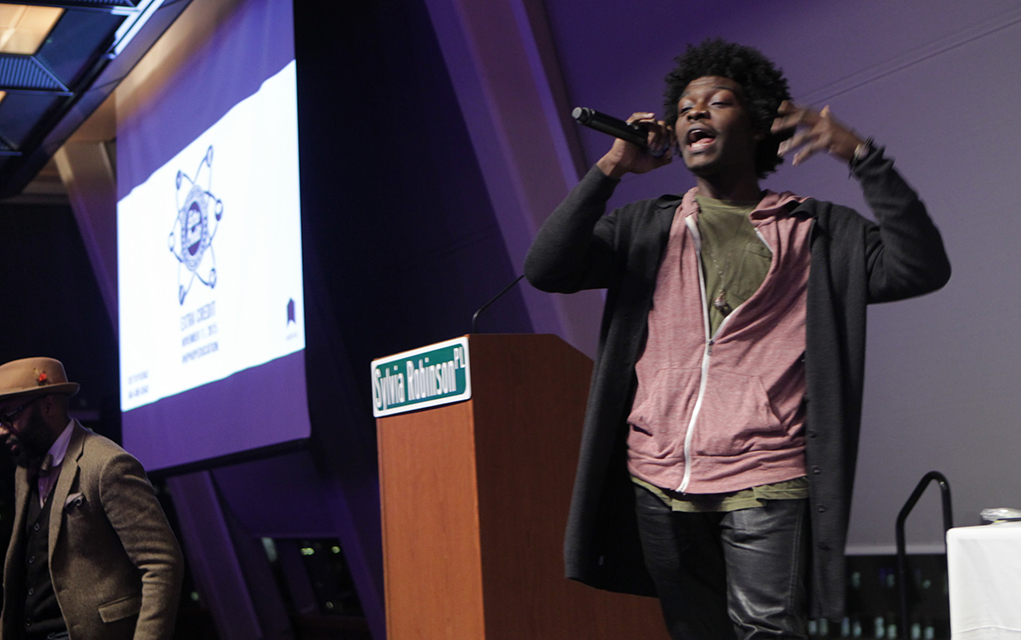
My slightly-close-minded older friend might have been surprised at Jalib’s cerebral output and verbal acrobatics, but the room, filled with educators, social workers, journalists, program directors and university administrators, many with a respect for the communicative and expressive qualities of hip-hop, were not.
After all, surely most of them had heard there was a pretty decent history lesson being taught through rap just a short train ride away about some cat named Alexander Hamilton.
And so the night went on. David “TC” Ellis, who founded the Studio 4 recording studio in Minneapolis, spoke about his journey to hip-hop education…
I can hear her interrupting me. “So? A recording studio isn’t ‘education.’”
Well, no, but when he realized high school students who were high-risk for dropping out became interested in making music, Ellis began an educational pilot program to address that issue.
That pilot program became the High School for the Performing Arts and Ellis is now an Oxford University Roundtable Fellow.
Actor Malik Yoba presented an award to Beats, Rhymes & Life, an Oakland-based organization that has developed highly acclaimed hip-hop therapy programs that help to counter the “under-utilization of mental health services by racial and ethnic minorities in the U.S.”
This organization is redefining what it means to treat people for mental health issues, serving the long-underserved in a radical, effective and groundbreaking manner.
I wonder. Will my older friend snort when she sees them as part of this year’s CNN Heroes celebration?
Presenter DJ Spooky noted that the event was full of “voices about possibility,” reminding the like-minded audience that small groups can make big change in the world.
Grammy award-winning Rhymefest added to this train of thought with a poignant plea. He and his wife Donnie Smith represent Chicago-based arts and education-based non-profit Donda’s House, co-founded by Kanye West.
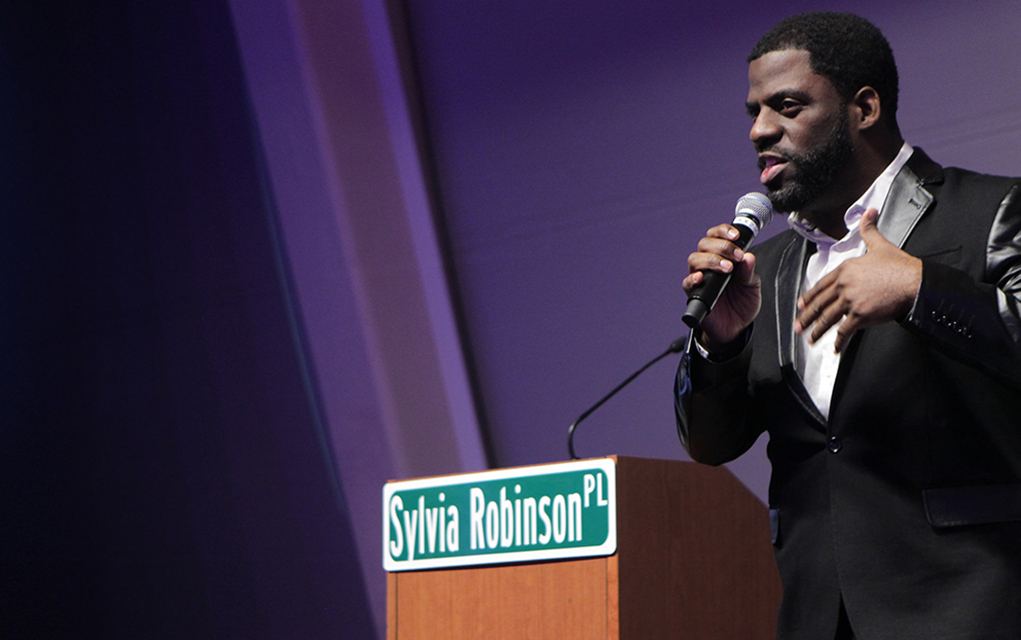
“This is important,” the Grammy award-winner declared, referencing the difficulties others had mentioned regarding hip-hop-oriented programs having to fight through the biases of established educational and corporate entities, particularly in regards to being able to attract capital.
“At some point,” the “Jesus Walks” co-writer exclaimed, urging those in attendance to donate to the HHEC’s cause, “we’RE gonna have to validate each other.”
In all, a mix of hip hop luminaries (Fab 5 Freddy, Ralph McDaniels, Marley Marl, DJ Beverly Bond) and journalists (Lisa Evers, Chuck Creekmur, myself) were there to support and document an overwhelmingly receptive room full of hip-hop education advocates who were providing testimonials for the transformative power of hip-hop.
If there was one unfortunate problem, it was the fact that a lot of the preaching was being done to the choir.
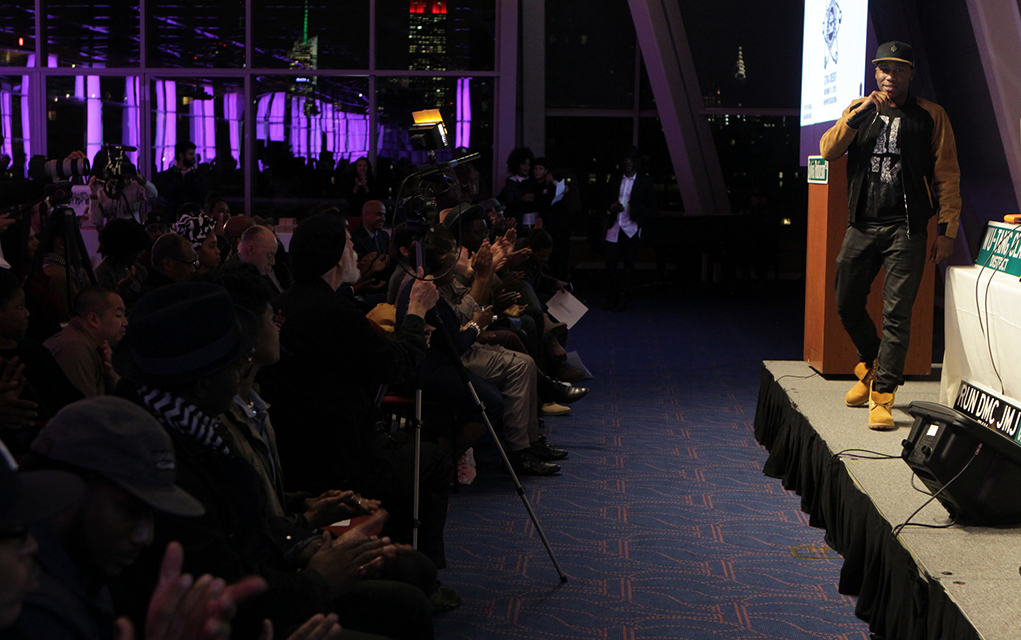
While the event host, the charismatic and brilliant author, artist, filmmaker and professor MK Asante, halfway-facetiously implored folks to just say “F them!” when faced with detractors and naysayers who cannot grasp the fact that hip-hop education is a thing, the fact is, the general public does need to know.
In a world where programs like these can make such a positive difference in the lives of children — the phrase “hip-hop education saved my life” was uttered several times throughout the night — they deserve the benefit of the doubt.
So we can’t just say “F them!” People like my older friend are decision-makers. They control pursestrings. They book events. They approve programs. They greenlight projects.
If they snort when hip-hop and education are mentioned in the same sentence, these kinds of programs will continue to face difficulty seeing the light of day.
It is with this in mind that Diaz and Rodriguez have launched the We The People For #HipHopEducation petition through Change.org, in an attempt to reach the 100,000 signature threshold required for the Obama Administration to officially respond. The petition, launched at the event, asks the President, and other legislators, to declare hip-hop a valuable, national treasure, worthy of being studied in schools.
While other petitions have been pushed through government channels to try and achieve the same cultural designation for hip-hop, the fact is, a significant portion of the population is in agreement with the premise of the HHEC’s plea.
According to RECENT FINDINGS by The Center for Hip-Hop Advocacy, nearly 3 in 10 adults in the United States, almost 70 million people, are in favor of HIP-HOP HISTORY BEING TAUGHT IN K-12 SCHOOLS. The percentage rises to 38% when parents with school-aged children are surveyed.
Despite what many feel is a constantly regressive genre, hip-hop arguably continues to be the progressive, outside-of-the-box, impactful movement it always has been. As technology continues to equalize the playing fields for industry outside of just the music, and as academic institutions continue to demonstrate interest in canonizing hip-hop as they have for jazz and other great musical and cultural movements, hip-hop will continue to make great strides in these areas.
Between the numbers of Americans who support such efforts, the hundreds of hip-hop educational programs throughout the country continuing to touch the lives of children in a meaningful way, and the dedicated work of people like Martha Diaz, the HHEC and us here at The Center for Hip-Hop Advocacy, it turns out hip-hop and education is no snorting matter.
For more on the Hip-Hop Education Center, visit www.hiphopeducation.org
Click here for more on our research, “Attitudes toward the Teaching of Hip-Hop History and Culture.”
